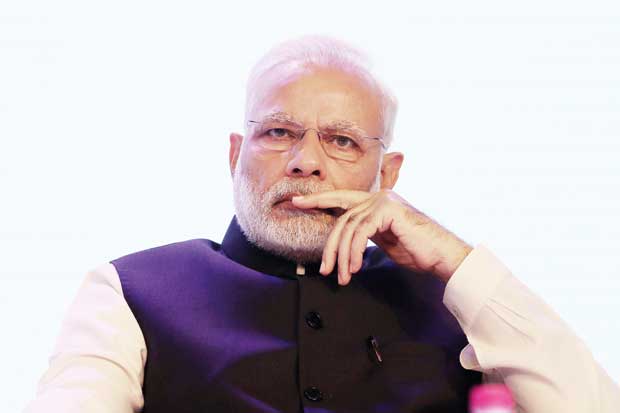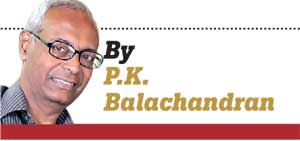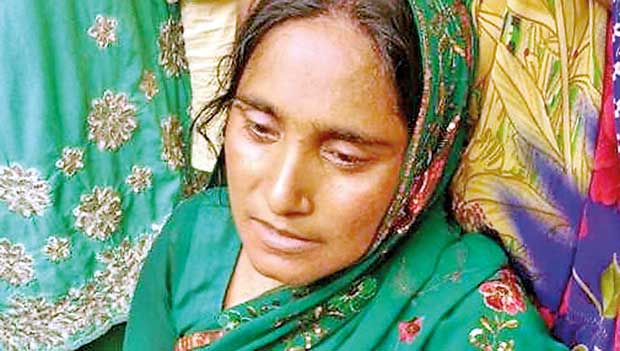Reply To:
Name - Reply Comment
Last Updated : 2024-04-26 20:44:00

Following adverse national and international media coverage of lynching of Muslims for eating beef or selling cattle for slaughter, India’s Prime Minister Narendra Modi last week broke his two year silence on the issue to say that Mahatma Gandhi would not have accepted the killings and that people shouldn’t take the law into their own hands.
But Modi didn’t denounce the violence, warn the perpetrators, order the police to take stern action and express sympathy for the victims. He merely “disapproved” of the wave of lynching in the mildest way. Indian President Pranab Mukherjee, was silent till Saturday when he made a statement that expressed anguish rather than anger.
“Are we vigilant enough proactively to save the basic tenets of our country?”, Mukherjee asked at a  private function in New Delhi.
private function in New Delhi.
“We shall have to ponder over, pause and reflect. When we read in the newspapers or see in the television that an individual is being lynched because of some alleged violation of law, when mob frenzy becomes so high, irrational and uncontrollable, we are to pause and reflect,” he said.
“Are we vigilant enough? I am not talking about vigilantism. Are we vigilant enough proactively to save the basic tenets of our country? We cannot avoid it. Posterity will ask us: What have you done?”, he asked.
By their hesitance to call a spade a spade, India’s top leadership may have created a Frankenstein’s monster which they may not be able to control in the months to come. When violent tendencies are not nipped in the bud, they acquire autonomy and a life of their own, which their creators will not be able to control.
 Sure enough, almost immediately after the Prime Minister’s mild rebuke, as if mocking it, a 100-strong mob lynched Alimuddin, a Muslim coal trader mistaken for a cattle trader, in Ramgarh in
Sure enough, almost immediately after the Prime Minister’s mild rebuke, as if mocking it, a 100-strong mob lynched Alimuddin, a Muslim coal trader mistaken for a cattle trader, in Ramgarh in
Jharkahand State.
With the police taking no action against the perpetrators, Muslim women of the village declared that they would “pick up arms” against the self-styled cow protectors, The Hindustan Times reported. The women believe that the government is in cahoots with the cow vigilantes. “Mob justice would be met with mob-justice,” declared Mariam Khatun, Alimuddin’s wife, as 70 women nodded in agreement.
Muslim men are becoming soft targets for communally charged gangs on the rampage and the women now wonder if it is safe for their men to go out. Earlier, in June, a 200-strong mob had thrashed a 55-year-old Muslim dairy owner and set his house ablaze after a carcass of a cow was found near his home in Giridih.
Muslim men with beards are now expected to publicly demonstrate loyalty to India according to the BBC. Speaking to the BBC Hindi service, a Muslim journalist with NDTV India, Munne Bharti, said that when activists of the Hindu extremist Bajrang Dal saw his veiled wife and bearded father on a highway in Bihar, they threatened to beat them with sticks and set their car on fire if they did not chant “Jai Shri Ram”, hailing the Hindu God Ram.
In their report entitled: “A Narrowing Space: Violence and discrimination against India’s religious minorities”, released last week, the London-based Minority Rights Group and the India-based Centre for the Study of Society and Secularism (CSSS) said that there were more than 700 outbreaks of communal violence in 2016 alone, with 86 killed and 2,321 injured. And Muslims typically made up the majority of the victims in these incidents.
Between 2011 and 2016, levels of communal violence had remained consistently high. The annual figures were as follows: 580 (2011); 640 (2012); 823 (2013); 644 (2014); 751 (2015); and 703 (2016).
Uttar Pradesh, Bihar and Madhya Pradesh, in the North; Rajasthan, Maharashtra and Gujarat in the West; and Karnataka and Kerala in the South were the hotspots. Together, they accounted for 2,512 incidents or over 85 per cent of recorded communal violence cases between 2013 and 2016.
Analysis of 62 incidents of communal violence between Hindus and Muslims during 2016, found that Muslims had been most affected. Out of four incidents which resulted in deaths, on which disaggregated data were available, 7 out of 8 reported deaths were Muslim. Out of five incidents where disaggregated data was available, 46 Muslims were injured compared to 11 Hindus. And in the three incidents where disaggregated data was available regarding attacks on houses, 67 Muslim homes had been attacked compared to one Hindu home. Even in arrests, the police targeted Muslims primarily.
 Mariam Khatun said husband Alimuddin traded in coal not cows
Mariam Khatun said husband Alimuddin traded in coal not cowsA study by the website IndiaSpends found that Muslims were the target of 51% of violence centred on the cow protection issue between 2010 and 2017. Among the 28 Indians killed in 63 incidents, 86% were Muslims.
As many as 97% of attacks on Muslims were reported after Narendra Modi came to power as Prime Minister in May 2014. About half the cow-related violent incidents (32 of 63 cases) were from states governed by the BJP when the attacks were reported.
In the first six months of 2017, twenty “cow-terror” attacks were reported, more than 75% of the figure for 2016. More than half (52%) of these attacks were based on rumors. According to Amnesty International, ten Muslims were killed by mobs since April this year.
The MRG-CSSS report notes that the political leadership sanctions the violence and intolerance. A Central government Minister, Mukhtar Abbas Naqvi, had said that those who want to eat beef may migrate to Pakistan. Sadhvi Saraswati had declared that beef eaters should be hanged.
In late May 2017, the Environment Ministry issued controversial rules regarding the Regulation of Livestock Markets under the Prevention of Cruelty to Animals Act. These rules require all buyers and settlers at animal markets across the country to give an undertaking confirming that any cattle traded will be used solely for agricultural purposes. This has been criticized as a backdoor national ban by effectively making it illegal for cattle to be sold for slaughter. This adversely affects the Muslims as they not only eat beef but also slaughter cattle for sale of meat.
From the stage of registering a communal violence case to pursuing it in court and getting a conviction, the minorities, especially Muslims, face insurmountable difficulties, the MRG-CSSS report points out. The previous Congress government had tried to change the situation through the Prevention of Communal and Targeted Violence (Access to Justice and Reparations) Bill. But the BJP blocked it in 2014.
However, thanks to the social media, concerned groups of Indians came out of their comfortable shells and demonstrated in all the metros under the banner “Not in My Name”. This nation-wide movement, in which the elite of the society participated, drew national and international media coverage.
Modi’s “disapproval” of lynching came in the wake of this spontaneous movement. His belligerent chief of staff, Amit Shah, said that the central government cannot be blamed because Law and Order is a “devolved” subject and Minister Venkaiah Naidu said that lynching was not done for “religious reasons” in a lame defence of Hindutva.

Add comment
Comments will be edited (grammar, spelling and slang) and authorized at the discretion of Daily Mirror online. The website also has the right not to publish selected comments.
Reply To:
Name - Reply Comment
US authorities are currently reviewing the manifest of every cargo aboard MV
On March 26, a couple arriving from Thailand was arrested with 88 live animal
According to villagers from Naula-Moragolla out of 105 families 80 can afford
Is the situation in Sri Lanka so grim that locals harbour hope that they coul

2 hours ago
4 hours ago